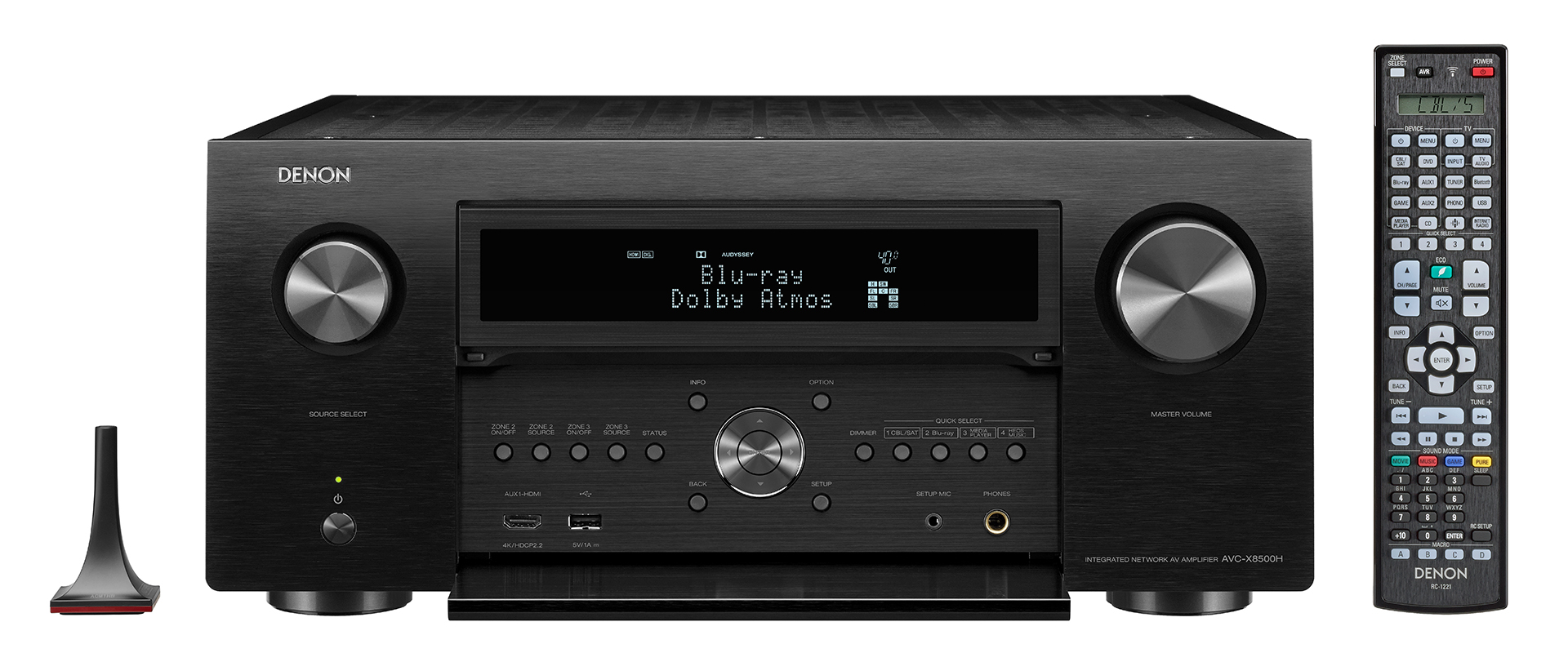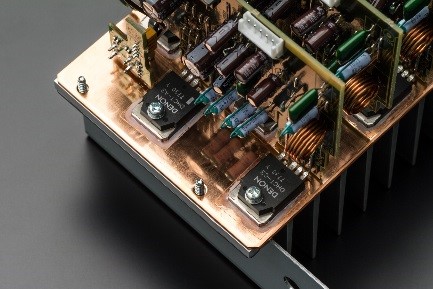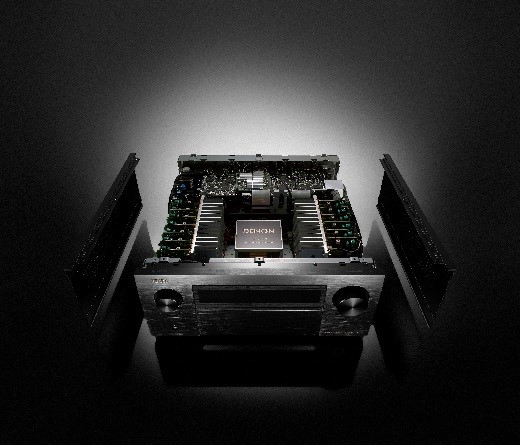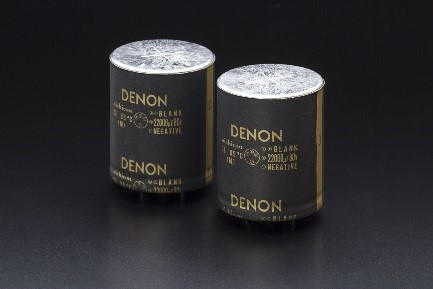Denon AVC X8500H review
“The Denon Flagship AVC-X8500H powers the next generation of home theater with the world’s first 13.2 channel AV Amplifier that supports the latest immersive audio formats, including Dolby Atmos, DTS:X and Auro-3D. Built-in HEOS technology supports Amazon Alexa* and takes music listening to the next level with wireless whole-home audio.”
-----------------------------------------------------
Associated test equipment:
Specifications:
The technical blurb:
“The Denon Flagship AVC-X8500H powers the next generation of home theater with the world’s first 13.2 channel AV Amplifier that supports the latest immersive audio formats, including Dolby Atmos, DTS:X and Auro-3D. Built-in HEOS technology supports Amazon Alexa* and takes music listening to the next level with wireless whole-home audio.”
Some important info online:
The Japanese website has some of the most in depth info:
https://www.denon.jp/jp/product/hometheater/avreceivers/avcx8500h
http://pr.denon.com/jp/denon/Lists/Posts/Post.aspx?ID=518#.WpuirpNuYcl
The Japanese website has some of the most in depth info:
https://www.denon.jp/jp/product/hometheater/avreceivers/avcx8500h
http://pr.denon.com/jp/denon/Lists/Posts/Post.aspx?ID=518#.WpuirpNuYcl
Associated test equipment:
PS64D8000FM
Samsung plasma TV
Denon
AVC X8500H
Marantz
SR 7010 – XT 32, 11.2 capable with nine amps inbuilt, twin sub out, Atmos and
Auro capable
Marantz
PM 11S3 : 2 channel stereo amp with HTbypass and 100W per channel driving the
front pair of Dynaudio Confidence 1 Platinum
Marantz
NA11S1 as a DAC and network player
Dynaudio
Confidence C1 and Centre Platinum front and centre
Usher
520 rear back
Monitor
Audio RXFX in dipole mode for side surrounds
JL
Audio E112 (one unit)
Anthony
Gallo A'Diva for ceiling Atmos placement and "Voice of God" placement
QED
XT Revelations for front and centre speakers
QED
Micro speaker cable for the surrounds
Audioquest
Cinnamon HDMI for Oppo to amp
AQ
Forest HDMI cable - amp to TV and other sources
Audioquest
Snake subwoofer cable
Blue
Jean subwoofer cable
Wireworld
Oasis 6 & 7 Interconnects
Wireworld
Oasis 6 power cables
Assorted Xindak, PS Audio and other power cables
Assorted Xindak, PS Audio and other power cables
MK
wall power sockets
PS
Audio Juice Bar
Rhodium
Right Angle Plug adapters for USA power cables
Auralex
subdude platform and Mopads under centre speaker
Da
lite screen
___________________________
First,
I will go through a summary my thought process for buying this amp.
It’s
been a while since I upgraded my amp. I went through the Denon 7200, (great amp
for HT), to the Marantz SR 7010, which stayed in my system for quite a while
and now with the advent of HDMI 2.1, as well as more channels for surround, I
felt that it was time for an upgrade.
I
decided that I wanted the smartest ‘brains’ for my HT system, as movie viewing
dominates my time, and music was secondary, but when I listen to music, I still
want a solid experience. My past experiences with Denon and Marantz were all
good, so it made sense to go for them, and since they typically have the latest
features, whilst retaining their musical roots, it felt like the logical
choice.
I
would then use a proper stereo amp for critical two channel listening.
____________________
The
three new 3D sound formats all: Atmos, Auro and DTS X have been with us for
about three years, with Auro more or less being relegated to the sidelines in
terms of user adoption, whilst Atmos equipped titles have outnumbered DTS ones
by more than three times. And this amp can do all three, with the cost of the
Auro upgrade included.
___________________________
The
caveat?
The MSRP of a new 8500 is around twice of the
lower end models, and about 1k more than the Marantz SR 8012, which comes with
a toroidal transformer and other audiophile bits.
_____________________
Some
photos of the innards:
-->
Some
useful improvements that I like (the bits in bold in particular):
- Upgradable
to HDMI 2.1
-
7+1 HDMI inputs and 3 out at the back
-
15.2 main zone pre-outs vs.
- 13 channels
of power
-
ISF Certification (allows different Day/Night video calibration settings per input)
- Bluetooth,
HEOS built in for wireless streaming
-
Networking and WiFi built in, with support for DSD and hi-rez (192kHZ) FLAC and
WAV files via network stream or USB
-
A new “TV Audio On/Off” setting to defeat the annoying auto switching caused by
an HDMI-CEC ARC connection
- Return of
Quick Select buttons on the remote
menus will
now be reserved for more global adjustments)
- 2
pieces of 32 bit all in one dual processor Sharc DSP processors ADSP 21573
- The 4 ohm capability.
- Audyssey XT 32 AND Sub EQ
-
Audyssey app (at extra cost USD 19.99)
-
AKM 4490EQ DACs. The best in the business right now. Same ones as in the 7200
and also the AV 8802 processor
- Improved GUI. The entire user interface can now be regarded as a
wonderful experience, instead of merely painful for the experienced user, or
very daunting for the newbie.
- Ability to
save configurations
- Free assign amps
- Built-in Airplay
- Well built
speaker posts. Not WBT standard but certainly better than those on amps like
the Emotivas or even the NAD / Onkyos.
-
Gold plated
RCA inputs
- free Auro
3D (via a future firmware update)
- hand built
in small batches, with better panel construction including triple chassis
construct, copper plates to help disseminate heat
- DTS Virtual:X
- Dialogue Enhancer
What I
disliked:
- 44 0000 uF
of capacitance which is down, considering the same caps are used for only 9
channels in the 7200.
-
We lose the network hub
- No second
remote
-
Only one set
of speakers being used displayed – can only display input or output at one time.
This was lost with the 4311, and that’s a pity.
-
No more Hi
Def blue light, and merely “Dolby Atmos” on the LED screen.
-
No paper manual – just a tiny get started booklet plus a CD (actually all I need is a big
diagram of the rear panel for hookup purposes)
- no more
tuner(of course some may like it, and decide it means less interference)
-
four fans
The
biggest difference?
That
would be:
-
more channels
- new DSP
chips
-
Dolby Surround upmixer
Plus
the potential to upgrade to Auro-3D. And there is also talk of DTS X in 13
channels for this model in a later upgrade.
The build of this amp is really much better than the average AV amplifier. The chassis, the footers and even the trap door have receieved a lot of care.
Despite only using the same caps as in the 7200, the transformer is much heavier and this bodes well for the power supply.
The build of this amp is really much better than the average AV amplifier. The chassis, the footers and even the trap door have receieved a lot of care.
Despite only using the same caps as in the 7200, the transformer is much heavier and this bodes well for the power supply.
___________________
Differences
between the Marantz SR 8012 and the Denon AVC X8500H
Marantz SR
8012
|
Denon AVC
X8500H
|
Remarks
|
|
DSP
chipset
|
ADSP
21487 (4)
|
ADSP
21537 (2)
|
aka
Griffin Lite
|
Power
|
11
channels
|
13
channels
|
|
Capacitance
|
?
44 000uf
|
44
000uF
|
|
Processing
capability
|
11
|
13
|
|
Pre-outs
|
11
|
15
|
|
Transformer
|
Toroidal
|
Square
|
|
Chassis
|
Copper
|
Triple
layer
|
Denon
– hand built in small batches
|
Weight
|
17.4
kg
|
23.6kg
|
|
Sound
enhancements
|
HDAM
modules
|
DDSC
AL32 processing
|
|
HDMI
|
2.0b
|
2.1
(via an upgrade)
|
|
DAC
|
AKM
4458VN
|
AKM
4490EQ (one per channel)
|
|
Power
consumption
|
780W
|
900W
|
|
Audyssey APP support
|
Paid
extra
|
Paid
extra
|
|
RC 5 trigger
|
Activates
other Marantz products
|
nil
|
|
Remote
|
Backlight
button
|
Motion sensor backlight
|
|
___________________________
Anyway, so
how does it all hang together?
As
mentioned earlier, I use the Denon mainly in HT, so that’s where I will be
spending most time describing it.
Setup:
Like
it’s predecessor the 7200WA, this amp is one of the easiest to setup, from the
way the GUI brings you through the various steps, to the use of the microphone
for the calibration, and one can almost forgo the manual in setting up this
machine.
The
remote control is quite similar to the older one from the 7200, and I had
programmed the remote to replace the Marantz remote. I wished they had the
codes for the Marantz built in, especially since they were cousin companies.
The
Audyssey calibration was also faster. The inclusion of labels for the speakers
and connectors was a nice touch. The little rocket tripod for holding the
microphone was another. It is cute, and yet it’s actually quite useful.
How
to reset the amp:
How
do I reset the microprocessor or do a network reset?
When the AVR is acting up or doing something strange, try the following steps before resorting to a microprocessor reset:
1. "Restart" - set the AVR to Standby and press/hold the power ON button until "Restart" is displayed on the front panel.
If no joy, then ...
2. Soft reset - set the AVR to Standby and unplug the power cord for about 10 minutes, then plug back in the power cord and turn ON.
If neither of the above resolves the issue, then you'll need to either do a network reset (if network related) or a microprocessor reset. You'll also want to reset the microprocessor before doing anything else if you purchased the AVR as an "open box" or demo/used/refurb unit to ensure all settings are returned to their original factory defaults. Prior to doing a reset, you can SAVE the config file to a USB thumb drive so it can be LOADed after doing the reset (SETUP - GENERAL - SAVE&LOAD).
Network Reset (“Amp Assign”, “Speaker Config.” and “Video” settings are not reset)
1 - Turn ON the power using ON/STANDBY.
2 - Select the HEOS Music source
3 - Simultaneously press/hold the "DIMMER" and ">" buttons for at least 3 seconds.
4 - Release your fingers when "Network Reset" is displayed on the front panel.
5 - "Complete" will display when the reset has completed.
-------------
Microprocessor Reset (aka "Reset to original factory settings")
1 - Turn off the power using ON/STANDBY.
2 - Press and release ON/STANDBY (as you normally would when powering on the AVR) while simultaneously pressing/holding the "INFO" and "BACK" buttons on the front panel
3 - Remove your fingers from the two buttons when "Initialized" appears on the front panel display.
When the AVR is acting up or doing something strange, try the following steps before resorting to a microprocessor reset:
1. "Restart" - set the AVR to Standby and press/hold the power ON button until "Restart" is displayed on the front panel.
If no joy, then ...
2. Soft reset - set the AVR to Standby and unplug the power cord for about 10 minutes, then plug back in the power cord and turn ON.
If neither of the above resolves the issue, then you'll need to either do a network reset (if network related) or a microprocessor reset. You'll also want to reset the microprocessor before doing anything else if you purchased the AVR as an "open box" or demo/used/refurb unit to ensure all settings are returned to their original factory defaults. Prior to doing a reset, you can SAVE the config file to a USB thumb drive so it can be LOADed after doing the reset (SETUP - GENERAL - SAVE&LOAD).
Network Reset (“Amp Assign”, “Speaker Config.” and “Video” settings are not reset)
1 - Turn ON the power using ON/STANDBY.
2 - Select the HEOS Music source
3 - Simultaneously press/hold the "DIMMER" and ">" buttons for at least 3 seconds.
4 - Release your fingers when "Network Reset" is displayed on the front panel.
5 - "Complete" will display when the reset has completed.
-------------
Microprocessor Reset (aka "Reset to original factory settings")
1 - Turn off the power using ON/STANDBY.
2 - Press and release ON/STANDBY (as you normally would when powering on the AVR) while simultaneously pressing/holding the "INFO" and "BACK" buttons on the front panel
3 - Remove your fingers from the two buttons when "Initialized" appears on the front panel display.
-------------
Opening the box:
 I
personally felt the HT experience without Atmos or DSU was very similar to the
older 7200WA. The steering has improved vastly IMO, over the older 4520.
I
personally felt the HT experience without Atmos or DSU was very similar to the
older 7200WA. The steering has improved vastly IMO, over the older 4520.
But
the real improvement was when you try out the new ‘3D’ sound formats, and add a
whole layer of sound. It’s more than just sound that emanates from higher up. When you
engage Atmos or DTS X the surround experience is taken to a new level. Each
has it’s virtues and there is enough discussion which warrants a whole new
post, but they do sound quite different.
If
you have the 7200, and will only use 11 channels, I would suggest you hold onto
that for now. No doubt there is some additional drive, and certain aspect of
the steering seem better, but without a head to head comparison in the same
room with both amps, it’s hard to know which is superior. Suffice to say, the
8500 seems to have a clear swift steering, and the sonic bubble is immensely
immersive. The clarity is amazing and
yet, your ears won’t be ringing hot from a sound that’s too shrill. Those who
really prefer their treble to be razor sharp will prefer the Onkyo house sound
instead. But you will lose Audyssey XT 32.
Movies
with suspense and atmosphere benefitted the most, and if you have room for all
six overhead speakers, it’s a wonderfully immersive experience. When you
partner it with a nice set of speakers, you can really retrieve details; it was
clear without being fatiguing.
I
really like the Dialogue Enhancer, which is quite useful to help you follow the
dialogue on the screen without having to turn up the volume to maddening
levels.
We
have all gotten spoilt by Audyssey XT 32 and in particular the Sub HT EQ, which
allows calibration to be done with great ease, but you still need to check the
levels and tweak them after that. It’s impressive in the way it relieves the
user’s burden, but certinaly some elbow grease and extra work with a SPL meter
will do a lot of good. However the Denon has made the previously daunting task
of setting up a solid and seamless surround home theatre experience much
simpler.
The
amp section is meaty and the internal power section of this amp will be more than
sufficient for most speakers that one will buy to partner this amp I used it
with my 4ohm Dynaudios and they did not sound weak or seem to require more
power. However if you have a decent power amp, you may feel that the Denon have
less grip. But this is only if you compare it with a very good power amp.
Compared to my Marantz SR 7010, there is a distinctive difference in sonic signature, it's a tad less warm, but you get more in your home theatre experience, more bite and that may appeal to the HT fans.
In
stereo or Pure mode, there is a decent attempt at making good music. But compared
to the PM 11 S3, it still falls short, and the soundscape tends to be flat and
two-dimensional.
If
you needed to summarise the general sonic signature of this amp, it tends to
the neutral to warm side, probably due to it’s AKM Dacs, It is in between the
Marantz amps and the Onkyo in the relative brightness scale.
The
Denon functions best as a HT processor, and a surround processor for music.
When pressed into stereo music duties, it’s entirely listenable, and if you do
not have an expensive stereo setup, you will be quite happy with it.
I
also made extensive use of the Airplay function, which I found to be very
impressive. The Bluetooth experience was interesting, but ultimately lo-fi. I
will be testing out the other functions in due course.
Switching
back to HT again, and trying out the video section, you will find a very
competent video chip for upscaling and the colors are quite good. It’s subtle,
but I still prefer to go direct from my Oppo BDP 105 to the TV, but you will
lose the on-screen volume and overlay.
With
8 HDMI inputs, one HDMI output, legacy inputs and even a phono input, plus a
7.1 analogue input, you are well covered and won’t lack much in terms of connectivity.
The feature list is indeed very impressive. Build quality is very solid, it’s a
step or two up from the 7200. The sheet metal is solid, and the amp is well put
together.
It
also has two 12v triggers, and whilst it can do 15.2 outputs, you can only use
13.2 at once time.
After
a whole night of use, it's quite cool to the touch, but you should still give
it plenty of space. I use a laptop fan as well, which is powered by the
internal USB port.
-->
Network
control
There
are some plus and one big con. There is a new HEOS app, which allows
integration into the entire HEOS ecosystem, and you can control some parts of
the amp with the Denon 2016 AVR app, but you lose web control. To me this is a
big minus. You can’t check or change settings from the comfort of your PC,
neither can you switch it on and off via your computer. Boo…
So
where does all this put the amp?
Well,
if you have the older non Atmos amps, and but won’t be upgrading to 3D sound anytime
soon, there is no need to lose too much sleep over this one. The improvements
are mainly in the realm of the home theatre. The sound quality is comparable
and is not a quantum leap in difference.
However,
if you want to check out the new 3D sound formats, then you can’t really go
wrong with this. It is also Auro capable and you have the most number of
channels of any processor under 10 grand.
Now
how about the 7200WA? Well as I mentioned, if you don’t intend to utilise the
full complement of outputs, and won’t be using HDMI 2.1, then you are pretty
set. This ex flagship still holds it’s
own. Powerful and well equipped. It could be the bargain of the year for those
who do not need or want more than 11 channels. Many places are offering good
deals on this amp now. Don’t overlook it for almost 1.5k less.
If
you are in the market for a high level receiver, or a processor on the cheap
with free internal amps throw in, then this amp should be on your shortlist.
You get
a
considerable number of additional features and HDMI 2.1.
Pros:
13 channels usable at once
Big transformer that can power 13 channels
Well built - best of all the big brand HT amps right now
Does all three flavors: Auro, Atmos and DTS X
Cons:
Expensive
Not a big improvement if any over the older 7200 for audio
You need to pay for the HDMI 2.1 board upgrade
____________________________________________________________
I have no financial interest or other interests in any of the items / events I write about.
-->









Hi! Sorry for my bad english!
ReplyDeleteWell, I'm looking for a very long time for a replacement/upgrade for my Onkyo TX-NR5010 and the 2CH performance (music) is very important to me.
I really don't care about "hi-end explosions and bullets etc" but I care about a great bass, good textures on vocals, saxophones, very good soundstage, tonal balance (bla bla bla)... and this are my question:
Is the Denon X8500H a replacement/upgrade for my Onkyo TX-NR5010 in audio quality?
Onkyo uses Burr-Brown DAC, is this AKM4490 better? I'm very curious about this chipset
Thanks
Ivan